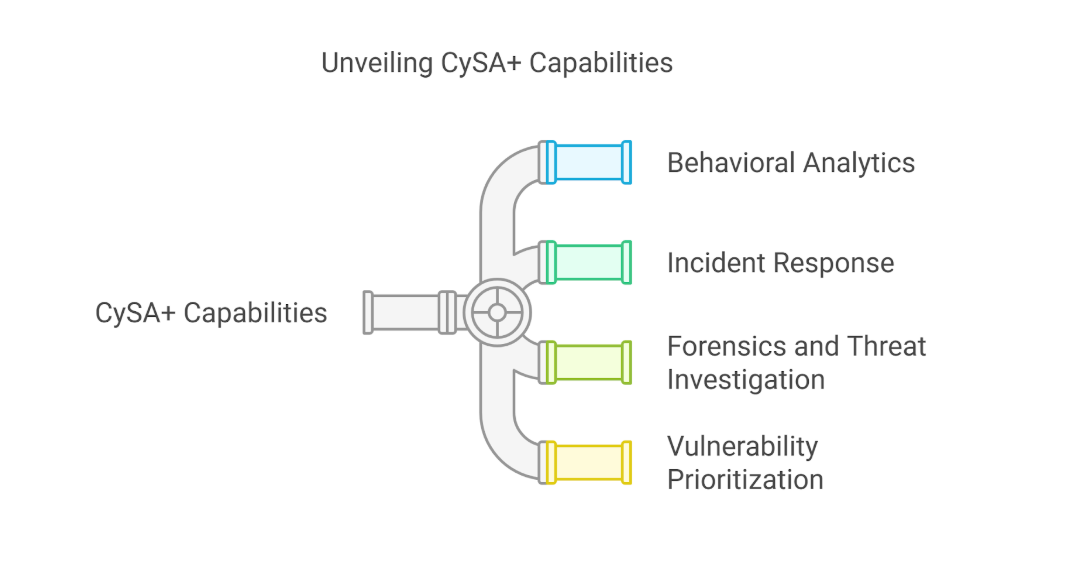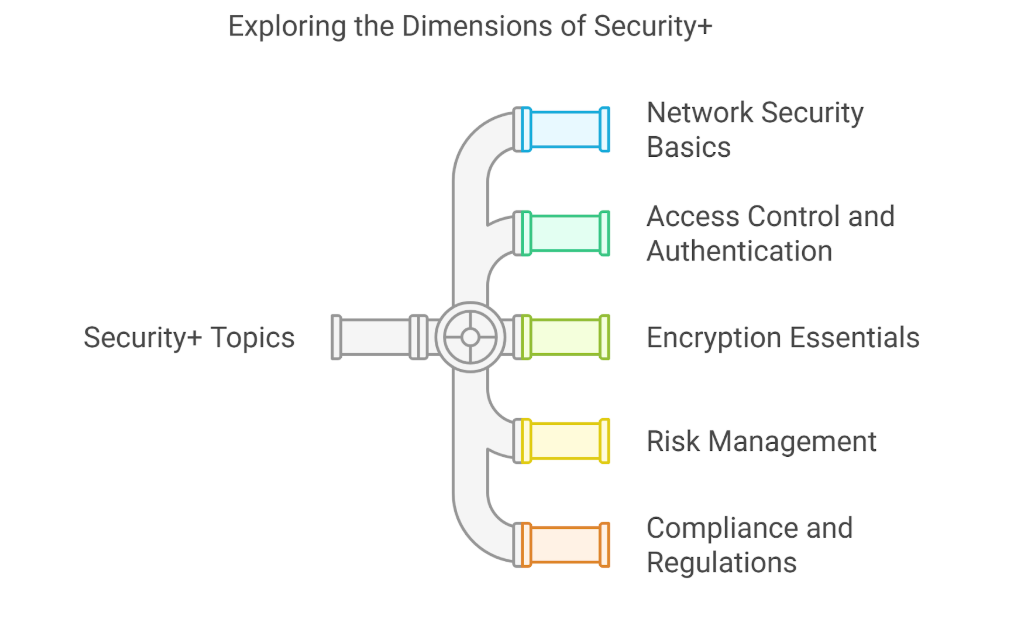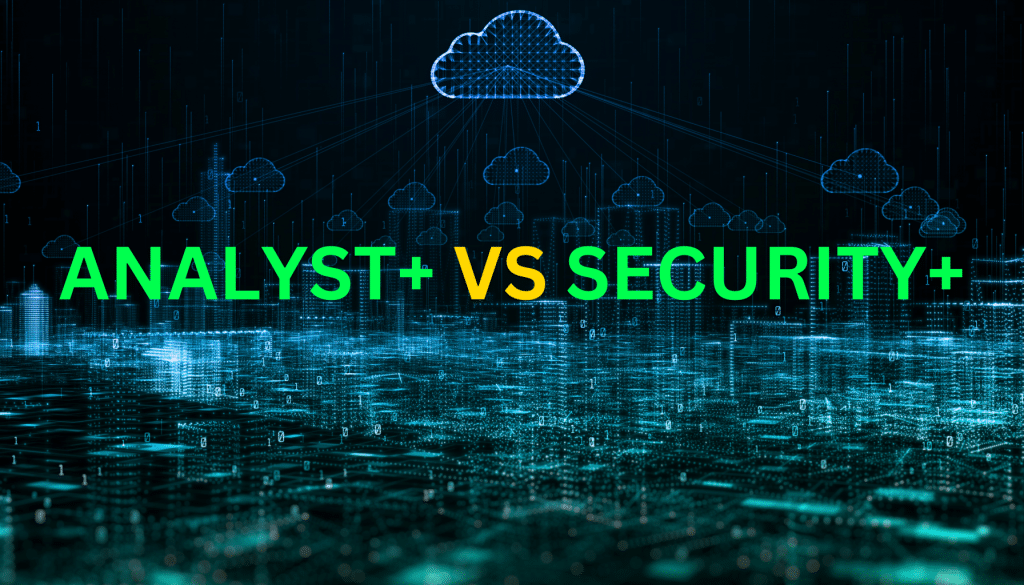Choosing the right cybersecurity certification can feel overwhelming, especially with many options promising career growth and better opportunities. CompTIA’s Analyst+ (CS0-003) and Security+ are two certifications that often stand out. Both are well-respected but serve different purposes and cater to distinct career goals.
Whether you’re just stepping into the cybersecurity field or looking to level up your skills, understanding the differences between these certifications is key to making an informed choice. So, which one aligns better with your aspirations?
Let’s dive in and find out!
Comparison
| Aspect | Analyst+ CS0-003 | Security+ |
| Overview | An entry-level certification focused on cybersecurity fundamentals, particularly in threat management and incident response. | A widely recognized entry-level cybersecurity certification that covers a broad range of security topics. |
| Target Audience | Individuals starting their career in cybersecurity or those transitioning from other IT roles. | Entry-level professionals and those seeking a comprehensive understanding of cybersecurity concepts. |
| Focus Areas | Threat Management Incident Response Risk Management Network Security | Network Security Identity and Access Management (IAM) Cryptography Risk Management Threats and Vulnerabilities |
| Prerequisites | Basic knowledge of IT and some exposure to security concepts are recommended. | No formal prerequisites; basic IT knowledge is beneficial. |
| Domains Covered | Risk Management Incident Response Threat Management Network Security | Threats, Attacks, and Vulnerabilities Security Architecture and Design Identity and Access Management (IAM) Cryptography Security Operations |
| Exam Length | 85 questions; 2 hours. | 90 questions; 90 minutes. |
| Exam Format | Multiple-choice and performance-based questions. | Multiple-choice and performance-based questions. |
| Exam Fee | $349 (USD). | $392 (USD). |
| Certification Maintenance | Valid for 3 years; requires continuing education (CEUs). | Valid for 3 years; requires Continuing Professional Education (CPE) credits. |
| Difficulty Level | Moderate; designed for individuals just starting in cybersecurity. | Moderate to challenging; suitable for those seeking a broad understanding of security concepts. |
| Industry Recognition | Recognized for individuals pursuing cybersecurity analyst roles. | Highly recognized across the industry as a foundational security certification. |
| Job Roles | Cybersecurity Analyst IT Security Consultant Incident Responder | Network Administrator Security Consultant IT Security Specialist |
| Salary Impact | Entry-level salary range ($50,000–$85,000 annually). | Entry to mid-level salary range ($55,000–$85,000 annually). |
| Ideal For | Individuals starting their cybersecurity career, focusing on threat management and incident response. | Those seeking a broader foundational understanding of cybersecurity concepts applicable across various job roles. |
| Vendor | CompTIA | CompTIA |
Diving Into CySA+: What Makes It Stand Out?
In a world where cyber threats evolve daily, having the right tools and skills to detect and respond proactively is essential.
The CompTIA CySA+ (Cybersecurity Analyst+) certification is designed to bridge the gap between basic cybersecurity domain knowledge and advanced, real-world threat analysis. It stands out because it’s tailored for those ready to move beyond foundational skills and tackle more dynamic and technical roles in cybersecurity.
Unlike entry-level certifications, CySA+ deepens into behavioural analytics, advanced monitoring, and detailed vulnerability assessment. It’s not about scratching the surface but equipping you with the expertise to think like a threat hunter.
This makes CySA+ a favourite among professionals who want to specialize in detecting, analyzing, and mitigating threats effectively.
New to cybersecurity and want the full breakdown? Here’s a concise CompTIA SY0-701 exam guide covering objectives, format, and study tips.
CompTIA CySA+: An Analyst’s Tool for Proactive Threat Detection
When it comes to proactive threat detection, CySA+ shines. It trains you to look beyond automated alerts and basic system scans. Instead, it teaches you to dig into the behavior of network traffic, identify anomalies, and determine whether they indicate a potential threat. The certification is hands-on, emphasizing practical techniques over theoretical knowledge.
For example, CySA+ certification covers:
- Behavioral Analytics: Learning to recognize unusual patterns in data that might indicate an attack in progress.
- Incident Response: Managing the steps after a breach, from containment to recovery.
- Threat Intelligence: Gathering and interpreting data about known and emerging threats to stay one step ahead of attackers.
- Advanced Vulnerability Management: Assessing weaknesses in systems and providing actionable solutions.
This practical focus on security assessments makes CySA+ a go-to for professionals in environments where quick and accurate threat analysis is critical. Think of it as a toolkit that prepares you to take charge during high-stakes situations, ensuring systems are safe and secure.
Key Skills You Gain with CySA+ Certification
CySA+ certification isn’t just another line on your resume, it’s a skill-building powerhouse. The skills you gain directly translate to job responsibilities, making you more marketable and effective in your role. Here’s what you’ll walk away with:
- Threat Detection and Analysis
You’ll learn how to identify, evaluate, and respond to threats in real time. This includes understanding complex data sets, recognizing anomalies, and correlating patterns to detect malicious activities. - Incident Management
From the first signs of a breach to the final steps of recovery, CySA+ prepares you to handle incidents with a clear and systematic approach. This includes root cause analysis and ensuring similar breaches don’t happen again. - Vulnerability Assessment
You’ll master tools and techniques to evaluate the security of networks, devices, and software. This includes prioritizing vulnerabilities based on their potential impact. - Working with Security Information and Event Management (SIEM) Tools
SIEM tools are vital for monitoring and analyzing security data. CySA+ equips you with the skills to use these tools effectively for tracking and mitigating risks. - Collaboration Across Teams
Cybersecurity isn’t a solo job. You’ll gain experience in working with other IT and security professionals to share information, solve problems, and build stronger defenses.
These skills aren’t just theoretical, they align directly with what employers look for in job candidates. This makes CySA+ a valuable investment in your career.
The Job Market Advantage: Roles Best Suited for CySA+ Professionals
The job market for CySA+ certified cybersecurity professionals is thriving, thanks to a growing demand for specialists who can analyze and respond to complex threats. If you hold this certification, you’re stepping into a space where your skills are highly sought after. Some of the roles you’ll be well-suited for include:
- Security Operations Center (SOC) Analyst
SOC analysts are the front-line defenders of an organization’s digital assets. With CySA+, you’ll have the knowledge to monitor systems, analyze threats, and respond to security incidents quickly and effectively. - Threat Analyst
In this role, you’ll focus on understanding and countering potential threats. This includes researching new attack methods and staying ahead of cybercriminals by predicting their next moves. - Incident Response Analyst
When a breach happens, incident response analysts take charge. They investigate the attack, contain the damage, and ensure systems are secure before going back online. CySA+ gives you the tools to excel in these high-pressure situations. - Vulnerability Management Specialist
Identifying and fixing vulnerabilities is a critical part of cybersecurity. With CySA+, you’ll be equipped to lead efforts in assessing and patching system weaknesses. - Cybersecurity Analyst
This is one of the most common roles for CySA+ holders. It involves monitoring and protecting systems, analyzing security reports, and developing strategies to enhance overall security.
The demand for these roles is growing across industries, including finance, healthcare, government, and technology. With CySA+, you’ll be in a strong position to secure a role in a field that offers both job stability and competitive salaries.
For salaries, growth paths, and hiring demand by industry, explore job roles and trends for CS0-003 professionals.
A Closer Look at Security+: The Gateway to Cybersecurity
Starting a cybersecurity journey without foundational knowledge is like jumping into the deep end without swimming lessons. CompTIA Security+ solves that problem by giving you a structured introduction to essential security concepts first. It’s often the go-to choice for beginners because it’s designed to teach you the “what” and “why” behind security practices.
Some of the key reasons Security+ is the first step for many security solutions include:
- No Experience Required: Unlike more advanced certs, Security+ doesn’t expect you to have prior technical experience. It’s beginner-friendly, making it accessible to those just starting out.
- Broad Coverage: From networks to cryptography, Security+ touches on a little bit of everything. This broad scope helps you figure out which areas you want to specialize in later.
- Industry Recognition: Employers across the globe recognize and trust Security+ as a validation of essential cybersecurity skills.
- Compliance-Friendly: It meets government and industry standards, making it valuable for roles in regulated sectors like healthcare, finance, and defense.
For many, Security+ acts as a stepping stone not just to other certifications but to confidence in handling cybersecurity challenges. You can learn more about Cybersecurity certifications here: https://certempire.com/easiest-cybersecurity-certifications/
Core Competencies and Foundational Skills You Build
Security+ doesn’t just scratch the surface; it lays the groundwork for a solid cybersecurity career. By earning this certification, you’ll develop core competencies that employers value. Here’s a breakdown of the foundational skills you gain:
- Network Security Basics
Learn how networks operate, how they’re structured, and what makes them vulnerable to attacks. This includes understanding firewalls, VPNs, and other protective measures. - Risk Management
Discover how to identify, assess, and manage security risks. You’ll also learn about different types of threats, including malware, phishing, and insider attacks. - Cryptography Fundamentals
Get introduced to encryption and how it’s used to protect sensitive information, from securing emails to safeguarding financial transactions. - Access Control
Understand how to implement user authentication and access control methods to ensure that only authorized individuals can access critical systems. - Incident Response Basics
Learn the steps to handle security incidents, including identifying breaches, containing the damage, and ensuring systems are restored. - Regulations and Compliance
Get familiar with laws, regulations, and frameworks like GDPR, HIPAA, and PCI-DSS. These are essential for jobs in industries where compliance is non-negotiable.
These skills aren’t just theoretical; they’re practical, hands-on abilities that you’ll use in real-world scenarios. That’s why Security+ is often considered the ideal way to “get your feet wet” in cybersecurity.
For domain-by-domain objectives, PBQ expectations, and scoring details, see the Analyst+ CS0-003 exam guide.
Security+ vs CySA+ Salary Insights: How It Pays Off
The earning potential for Security+ certified professionals varies depending on factors like job role, experience, and location. However, it’s widely acknowledged as a solid certification to boost your starting salary. Here’s how it stacks up compared to CySA+:
- Entry-Level Opportunities
Security+ primarily leads to entry-level roles such as:- IT Helpdesk Technician
- Junior Security Analyst
- Network Support Specialist
Salaries for these positions typically range between $50,000 and $75,000 annually, depending on the region and organization.
- Mid-Level vs Entry-Level
CySA+ certified professionals often take on mid-level roles like SOC analyst or threat intelligence analyst. These roles command higher salaries, usually in the $80,000 to $100,000+ range. While CySA+ has better earning potential, it’s not ideal for beginners who don’t yet have experience. - Long-Term Growth
Security+ provides a strong base for climbing the career ladder. Many professionals use it as a stepping stone to pursue higher-paying certifications, including CySA+, CISSP, or CASP+. - Employer Demand
Security+ is frequently listed in job postings for entry-level roles. Its broad acceptance ensures you’ll find opportunities in industries like finance, healthcare, and government.
CySA+ vs Security+: Which Fits Your Career Goals?
Choosing between CySA+ and Security+ isn’t just about which one is “better.” It’s about figuring out where you are in your cybersecurity journey and what you want to achieve. Both certifications are respected in the industry, but they cater to different career stages and goals. Let’s break it down to help you decide which one aligns best with your ambitions.
Are You Just Starting Out or Looking to Advance?
One of the first things to consider is where you currently stand in your career. Are you just dipping your toes into cybersecurity, or are you ready to tackle more advanced roles?
- If You’re New to Cybersecurity: Security+ is the obvious choice. It’s specifically designed for beginners, offering a broad understanding of essential cybersecurity concepts. You don’t need prior experience, making it ideal for those transitioning into the field or just starting out. Think of it as your first step into the world of cybersecurity.
- If You’re Looking to Level Up: Analyst+ is better suited for professionals with some experience who want to focus on analytics, threat detection, and incident response. If you’ve already built a foundation with Security+ or have hands-on experience in IT, CySA+ will help you specialize and stand out in mid-level roles.
Your current skills and future aspirations play a big role in determining which certification makes the most sense for you.
Bridging the Gap Between Entry-Level and Mid-Level Roles
The key difference between Security+ and Analyst+ lies in the types of roles they prepare you for. Security+ is your ticket to entry-level positions, while Analyst+ is geared toward bridging the gap to mid-level jobs.
- Security+ Opens the Door: With Security+, you can land roles like IT support, network administrator, or junior security analyst. These positions focus on foundational tasks such as managing firewalls, implementing security protocols, and basic troubleshooting.
- CySA+ Takes You Further: CySA+ prepares you for roles like security operations center (SOC) analyst, threat analyst, or incident responder. These positions demand more advanced skills, including analyzing behavioral patterns, responding to breaches, and conducting forensic investigations.
By earning CySA+, you demonstrate to employers that you’re ready for the next step a critical move if you’re aiming for more responsibilities and higher pay.
Industry Preferences: What Employers Value More
When it comes to hiring, employers have distinct preferences depending on the role they’re looking to fill. Understanding these preferences can help you decide which certification aligns with your career goals.
- For Entry-Level Jobs: Security+ is often a baseline requirement for roles like helpdesk support, network technician, or junior IT auditor. Employers view it as proof that you understand the fundamentals of cybersecurity and can handle basic tasks without extensive training.
- For Analytical or Specialized Roles: CySA+ is a favorite for organizations that need professionals to analyze threats, manage vulnerabilities, and respond to incidents. It’s especially valued in industries like finance, healthcare, and government, where proactive threat detection is critical.
- Government and Compliance Jobs: Both certifications hold weight for government and regulated industries. Security+ meets Department of Defense (DoD) requirements, making it essential for many federal roles. CySA+, however, is gaining traction in these areas as the demand for threat analysts and incident responders grows.
- Tech and Enterprise Organizations: Larger companies with dedicated cybersecurity teams often prefer candidates with CySA+, especially for roles in security operations centers or forensic analysis. Smaller companies or generalist roles may lean more heavily on Security+.
Ultimately, the choice depends on the type of job you’re targeting and how quickly you want to advance. If you’re starting fresh, Security+ provides a strong foundation. If you’re looking to move into more technical, specialized roles, CySA+ is the way forward.
CySA+ Focus on Advanced Analytical Capabilities
CySA+ is all about going deeper into the technical side of cybersecurity. It’s designed for those who want to focus hands on information security by analyzing threats, detecting vulnerabilities, and responding to incidents in a systematic way. The certification builds advanced skills that go beyond basic security practices, preparing you for roles where critical thinking and problem-solving are at the forefront.
Some of the standout capabilities you develop with CySA+ include:
- Behavioral Analytics: Learning to spot irregular patterns in network traffic that might indicate a security threat.
- Incident Response: Managing every phase of a breach, from detection and containment to recovery and reporting.
- Forensics and Threat Investigation: Using tools and techniques to investigate security breaches and identify the root cause.
- Vulnerability Prioritization: Not all vulnerabilities are equal, CySA+ teaches you to focus on those with the highest potential for harm.

These advanced analytical skills make Analyst+ particularly valuable for mid-level roles. It’s ideal for professionals who want to transition from generalist positions to specialized, cybersecurity analysis jobs like threat analyst or SOC analyst.
Security+ as a Broad-Base Foundation for Cybersecurity
If Analyst+ is about depth, Security+ is about breadth. It covers a wide range of topics, providing a general understanding of cybersecurity principles. Security+ focuses on helping beginners grasp the “big picture” of information security without overwhelming them with complex technical details.
Some of the core topics covered by Security+ include security architecture:
- Network Security Basics: Understanding how networks work and the common vulnerabilities that attackers exploit.
- Access Control and Authentication: Learning how to secure systems by limiting access to authorized users.
- Encryption Essentials: An introduction to cryptography and its applications in securing data.
- Risk Management: Identifying and mitigating potential risks to organizational security.
- Compliance and Regulations: Familiarizing yourself with key security frameworks and standards.

Security+ is perfect for those who want to explore a wide range of cybersecurity and general security concepts, before deciding on a specialization. It’s also ideal for individuals who need a certification that’s widely recognized as a starting point in the field.
When Should You Opt for One Over the Other?
The choice between Analyst+ and Security+ depends on where you are in your career and what you want to achieve. Here’s a simple breakdown to help you decide:
Choose Security+ If…
- You’re new to cybersecurity and need a solid introduction.
- You’re aiming for an entry-level role like IT support, helpdesk technician, or junior security analyst.
- You want to understand the basics of networks, risk management, and general security principles.
- You’re unsure about which area of cybersecurity to specialize in and want to explore your options.
Choose CySA+ If…
- You already have some experience in IT or cybersecurity and want to advance your career.
- You’re interested in specialized roles like SOC analyst, threat analyst, or incident responder.
- You want to build advanced skills in behavioral analytics, incident response, and threat investigation.
- You’re ready for a more challenging certification that goes beyond the basics.
For many professionals, the ideal path starts with Security+ to build foundational knowledge and progresses to CySA+ for specialization. However, if you already have experience and know your career path, skipping directly to CySA+ might be a better use of your time and resources.
Preparing for Success: Tips for Exam Readiness
Passing a certification exam is about more than just memorizing facts. It’s about truly understanding the material and knowing how to apply it in real-world scenarios. Want a week-by-week routine with PBQ tactics and recall drills? Use these CS0-003 study tips to lock in a passing plan.
Whether you’re preparing for the CySA+ CS0-003 exam or the Security+ certification, having a solid plan will set you up for success. From understanding the exam format to using the right resources, let’s dive into how to get ready.
What to Expect on the Analyst+ CS0-003 Exam
The CySA+ CS0-003 exam is known for its focus on real-world applications, making it ideal for professionals with some hands-on experience. Here’s what you need to know before taking the test:
Exam Format and Structure
- Number of Questions: Up to 85
- Question Types: A mix of multiple-choice and performance-based questions (PBQs), which require you to solve simulated security problems.
- Time Limit: 165 minutes
- Passing Score: 750 (on a scale of 100-900)
Exam Domains
The CySA+ CS0-003 exam focuses on these main areas:
- Threat Detection and Mitigation: Identifying and responding to security threats.
- Incident Response: Handling breaches and minimizing damage.
- Vulnerability Management: Assessing and addressing system weaknesses.
- Compliance and Assessment: Ensuring adherence to industry regulations and frameworks.
Preparation Tips
- Understand the PBQs: Performance-based questions test your practical skills, so practice using tools like SIEMs, vulnerability scanners, and packet analyzers.
- Use Study Guides: Official CompTIA materials and third-party guides are excellent for covering all domains.
- Practice Tests: Taking practice exams helps you get comfortable with the format and identifies weak areas.
- Hands-On Practice: If you’re not already working in cybersecurity, try labs or simulations to build experience with the tools covered in the exam.
A Quick Guide to Security+ Certification Preparation
Security+ is a beginner-friendly certification, but that doesn’t mean you should take it lightly. Preparation is key to mastering its broad range of topics. Here’s how to approach it:
Exam Overview
- Number of Questions: Up to 90
- Question Types: Multiple-choice and performance-based questions.
- Time Limit: 90 minutes
- Passing Score: 750 (on a scale of 100-900)
Exam Domains
Security+ covers six domains:
- Threats, Attacks, and Vulnerabilities
- Technologies and Tools
- Architecture and Design
- Identity and Access Management (IAM)
- Risk Management
- Cryptography and Public Key Infrastructure (PKI)
Study Plan
- Learn the Basics: Use beginner-friendly guides to build a foundation in IT and cybersecurity.
- Practice Labs: Hands-on experience with tools like firewalls and VPNs is invaluable.
- Join Study Groups: Collaborating with others can help clarify complex topics and keep you motivated.
- Simulate Exam Conditions: Timed practice tests help you manage time and understand question patterns.
Exam Dumps by Cert Empire
For many candidates, exam dumps are an essential part of the preparation process. Cert Empire offers verified, up-to-date dumps for both CySA+ and Security+ exams. These resources provide access to real exam questions and answers, helping you understand what to expect and how to approach tricky questions.
Why Choose Cert Empire Dumps?
- Accurate Content: Questions are frequently updated to reflect the latest exam patterns.
- User-Friendly Format: Dumps are easy to navigate, saving you time during your prep.
- High Success Rate: Many professionals credit their success to Cert Empire’s reliable exam dumps.
Using dumps responsibly alongside study guides and hands-on practice can significantly boost your chances of passing.
Conclusion
Both the CySA+ and Security+ certifications offer unique opportunities to advance your cybersecurity career. Success comes down to preparation. Know the exam format, study consistently, and use trusted resources like Cert Empire’s dumps to give yourself an edge.
Whether you’re starting with Security+ or advancing with CySA+, a solid plan will ensure you’re ready to tackle the challenge and achieve your certification goals. Good luck!
FAQs
Which is better for a beginner, CySA+ or Security+?
Security+ is better for beginners as it covers foundational cybersecurity concepts, while CySA+ is more advanced.
How do Security+ and CySA+ compare in terms of salary potential?
Security+ roles typically pay $50k-$75k, while CySA+ positions range from $80k-$110k annually.
What job roles are common for CySA+ certified professionals?
CySA+ holders often work as SOC analysts, threat analysts, and incident responders.
Is CySA+ harder than Security+?
Yes, CySA+ is more challenging, focusing on advanced analytics and incident response skills.
Can I take CySA+ without having Security+ first?
Yes, but having Security+ or equivalent experience is recommended for better preparation.
Do employers value CySA+ more than Security+?
For specialized roles, CySA+ is more valued, but Security+ is essential for entry-level positions.
How long does it take to prepare for the CySA+ CS0-003 exam?
Preparation typically takes 2-4 months, depending on your prior experience and study schedule.
What industries prefer Security+ certification over CySA+?
Industries like IT support, small businesses, and government entry-level roles prefer Security+.
Does Security+ cover enough for a career in cybersecurity?
Security+ is a top security program management and great starting point, but additional certifications or experience are needed for long-term growth.
What other certifications pair well with CySA+ or Security+?
Certs like CISSP, CEH, and CASP+ complement CySA+, while Network+ is a good companion for Security+.


























